Legacy
Harvard Business School Professor C. Roland (Chris) Christensen was one of the founders of the field of business strategy and the world's leading authority on case method teaching.
Christensen joined the Harvard Business School (HBS) faculty in 1946, and although he formally retired in 1990, he continued to write, teach, and offer seminars on Case Method teaching until the last months of his life. In all, Christensen's career in the classroom spanned half a century. At the time of his death in 1999, he was the Robert Walmsley University Professor, Emeritus, at Harvard.
Beloved and revered by generations of HBS students, Christensen regarded himself first and foremost as a teacher who cared greatly about the people who had entrusted themselves to him for their education. “What an opportunity it is,” he reflected in an interview, “to have the privilege of being a teacher, the greatest of all vocations, for it keeps us anchored in the world of youth, ideas, and research. It enables those of us who follow this calling to help students learn, and in their accomplishments, as the playwright Arthur Miller has written, we leave our ‘thumb prints on the future.’” Thousands of Christensen’s students, including HBS Professor Michael E. Porter, went on to make their marks in the world, never forgetting the impact he had on their lives. “C. Roland Christensen’s commitment to ideas and his personal interest in me were the reasons I considered an academic career and developed a passion for research,” said Porter.
Harvard University President Neil L. Rudenstine has said, “Chris Christensen was in a class by himself. His contributions to the development of the case method, to research and teaching, to the charting of the wise course of the Harvard Business School and the University at large were immense.”
Biography
C. Roland Christensen was born on August 17, 1919, in Tyler, Minnesota. The scion of several generations of teachers, he grew up in Iowa City, where his father was a professor of history at the University of Iowa. His mother taught at a small college in Des Moines after beginning her career in a one-room schoolhouse. Conversations at lunch and dinner included all seven Christensen children and focused on such diverse subjects as geography, history, astronomy, and literature.
A 1941 graduate of the University of Iowa, where he was elected to Phi Beta Kappa, Christensen received an MBA from Harvard in 1943. After serving as a captain in the U.S. Army Quartermaster Corps from 1943 to 1946, he followed the advice of an HBS assistant dean and returned to the Business School to continue his education and to teach. Christensen earned his doctorate in commercial science from the Business School in 1953, falling under the tutelage of HBS luminaries such as Fritz J. Roethlisberger and George Albert Smith.
Starting out
As a young assistant professor at Harvard Business School in 1946, Christensen embarked upon the first of what he described as “the two great adventures of my career.” Along with several colleagues, he played a major role in developing the concept of corporate strategy as the organizing principle for a revised version of the School’s Business Policy course. Designed to give students the strategic perspective they would need as general managers, Business Policy became a jewel in the HBS curriculum and a source of many pioneering case studies.
At the same time, Christensen's extraordinary skills in the classroom became well known to students and faculty alike. To actively involve students in the learning process, which is the essence of the discussionmethod teaching he brought to such great heights at HBS, Christensen focused on turning the individuals who came to his course each year into “a learning community with shared values and common goals."
In the classroom, Christensen was a true artist, like the conductor of a symphony orchestra, as he posed questions to students, listened carefully to their replies, and then responded — all within the rapid give—and—take context of an energetic and rigorous discussion. The process involved much more than subject matter. It was an education in analysis and good judgment. Outside of class, he was dedicated to an immense amount of preparation and to making himself available for extra help and counsel.
Master Teacher
Named a full professor in 1958 and the first George F. Baker, Jr. Professor of Business Administration in 1963, Christensen began the second major phase of his career in 1968, when Dean George P. Baker asked him to co-chair a program to help other HBS professors improve their teaching capabilities. Dedicated to the belief that “good teachers are made, not born,” Christensen and several other faculty members responded by writing numerous cases that reflected a broad range of classroom situations. “While there were no paint-by-numbers solutions,” he once commented, “we could at least observe, abstract, and articulate some of the skills discussion teachers must have to be effective. There are so many parts that must fall into place to make the whole process work,” he continued. “How do you open a class? What student do you call on? How do you organize a course when the material is holistic? These kinds of questions intrigued me throughout my career.”
Another request for help came from Harvard President Derek Bok in the mid-1970s regarding the quality of teaching throughout the University. Building on his work at HBS, Christensen responded by creating two influential seminars, Developing Discussion Leadership Skills, attended primarily by Harvard doctoral candidates and young instructors, and Teaching by the Case Method, which attracted professors from all of the Harvard faculties. Over the years, a host of participants, including many of the University's most senior professors, attested to Christensen's many qualities as a master teacher, pointing not only to his wisdom and experience but to his compassion and attention to every detail.
Christensen also worked extensively with Harvard Medical School to introduce the discussion method into its curriculum by means of the New Pathway Program. In addition, he taught in several other parts of the University, including the Graduate School of Education, the Law School, and the School of Public Health.
In recognition of his contributions to the entire Harvard teaching community, President Bok named Christensen to a University Professorship in 1984, the first HBS faculty member to hold one of a select group of endowed chairs reserved for scholars whose work transcends a particular campus or academic department. “Chris Christensen has done more than anyone else at Harvard to improve the quality of our teaching,” Bok noted when he named Christensen to the Walmsley chair. Christensen later went on to become an important figure at Harvard University’s Derek Bok Center for Teaching and Learning.
Beyond Harvard, he served as a visiting professor at MIT’s Sloan School of Management, the Stanford Graduate School of Business, the University of South Africa (Pretoria), and the Iran Center for Management (Teheran). In the mid-1950s, he was part of a team of HBS professors whose advice to the top executives of Nestlé S.A. led to the creation of IMEDE (now IMD), the European management school in Switzerland. This outreach was a major step in the globalization of the Harvard Business School, and Christensen was a member of IMEDE's board of advisors for three decades. He was also a visiting professor there during the 1963-64 academic year.
The recipient of numerous awards, Christensen received Harvard Business School’s highest accolade, the Distinguished Service Award, in 1993. He held honorary degrees from Babson College and the University of Montreal. The Academy of Management’s Business Policy and Planning Division bestowed on him its first Outstanding Educator Award in 1987, citing Christensen’s seminal work in the field of business strategy.
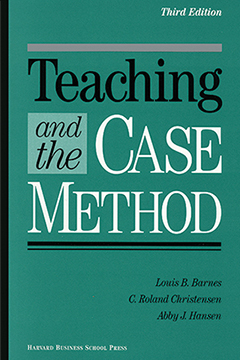
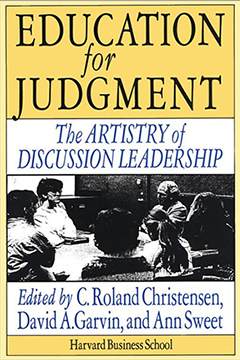
- 01 JUL 1992
Education for Judgment: The Artistry of Discussion Leadership
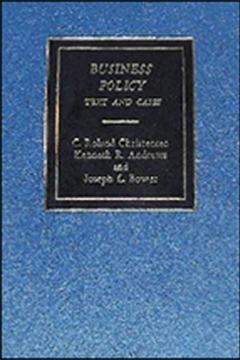
- 1995
Business Policy: Text and Cases
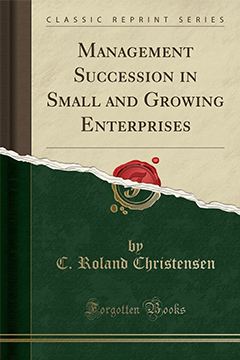
- 1979
Management Succession in Small and Growing Enterprises
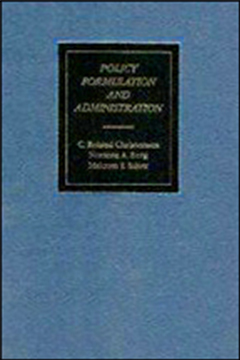
- 1976
Policy Formulation and Administration
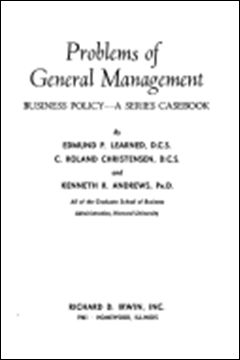
- 1961
